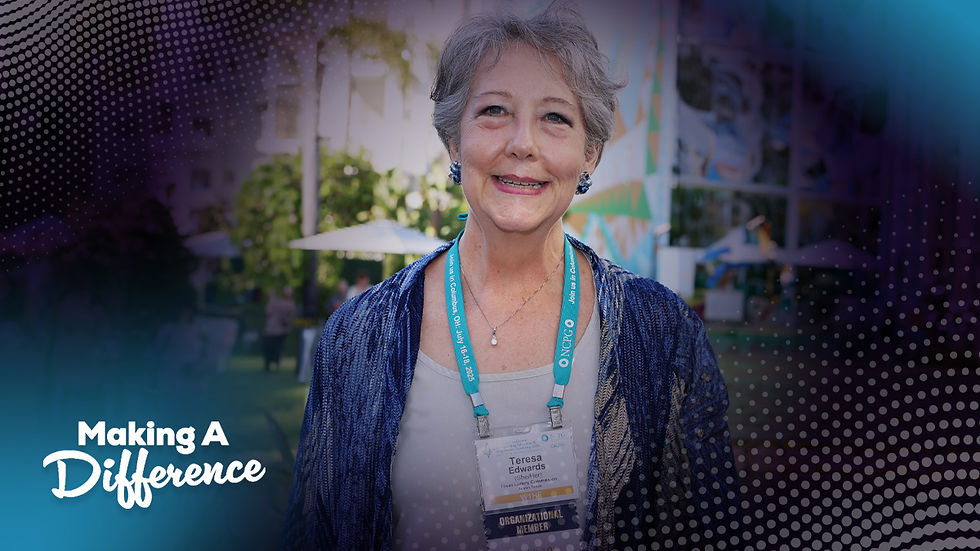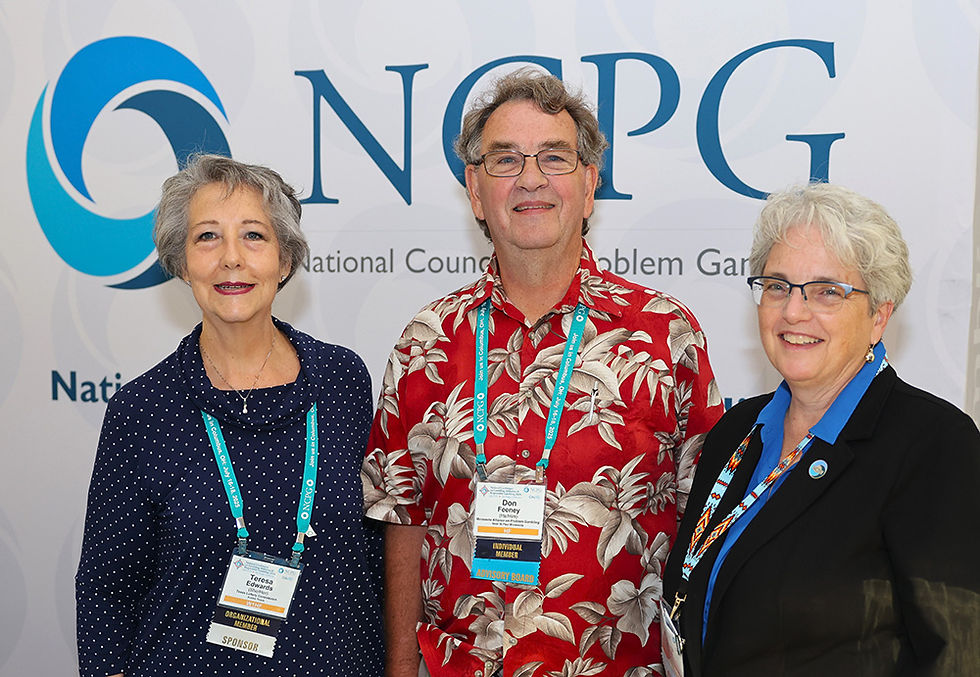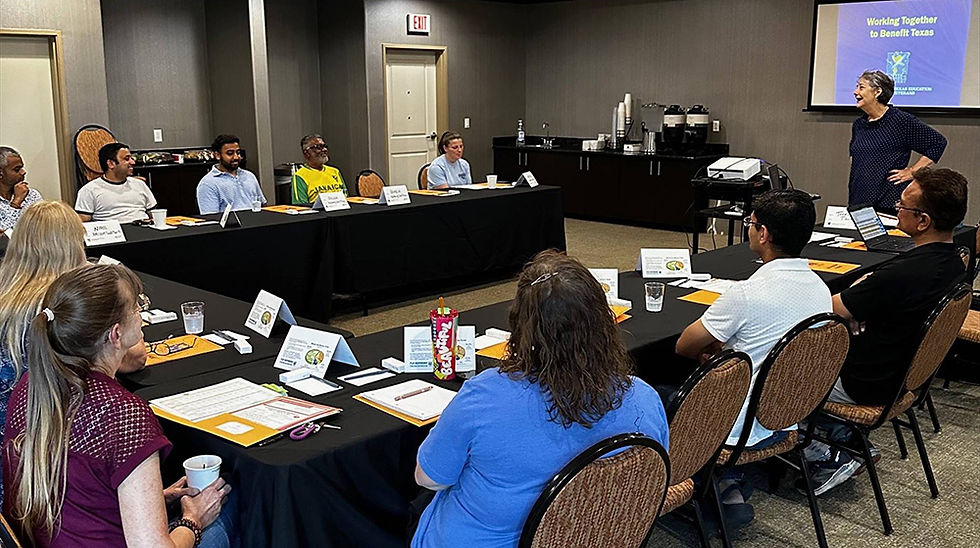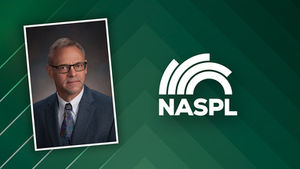Teresa Edwards
- Insights Online
- Sep 10, 2024
- 8 min read
Updated: Oct 2, 2024
Retailer Development/Responsible Gambling Coordinator
Texas Lottery Commission
Published September 11, 2024

Lotteries rarely have a free rein to initiate products and programs designed to drive sales – and revenues to the good causes they support. They have to navigate through governmental policy considerations that often make their task more challenging. The Texas Lottery has risen to the occasion, and has just completed its fourth straight year of sales in excess of $8 billion, placing it third among American lotteries by that measure. Helping to drive sales in a responsible manner is Teresa Edwards, whose dedication to the retailer network includes a significant role in the development, launch and management of a cash incentive program for retailers.
“Teresa has been a shining star at the Texas Lottery for many years because of her ability to manage multiple complex programs simultaneously, mostly focused on our retailers and making them successful sales agents,” says Robert Tirloni, Lottery Operations Director, Texas Lottery Commission. “She created from scratch, and managed effectively, both the Retailer Cash Incentive Program and the agency’s Responsible Gambling program. The Texas Lottery would not have achieved record-breaking sales without our ability to incentivize our retail base nor would we have WLA Level 3 certification without Teresa spearheading these important programs. She has been and continues to be a vital part of our operation and I am grateful to have her on my team. After working closely with her for the past 24 years, I consider her a close friend in addition to being a valued colleague.”
ADVERTISEMENT
After spending the early part of her professional career in public relations in the education, medical and event marketing fields, Edwards began her lottery journey with GTECH Texas (now IGT Texas) as a lottery sales rep just a few days before the Texas Lottery’s first ticket was sold in May 1992. After 13 years with GTECH, she jumped at the chance when the new position of Retail Development Coordinator was created at the Texas Lottery.
She was instrumental in the development of the Lottery’s first-ever performance-based retailer cash incentive program (RCIP). Launched in FY2009 after the legislature approved the provision of 0.5% of sales, the program’s primary goal is to provide incentives for retailers in order to generate additional revenue for the Lottery’s beneficiaries, the Foundation School Fund and the Fund for Veterans’ Assistance. For the first time in Texas, retailers could earn incremental revenue on top of the 5% commission on all game sales; unlike many other states, there are no cashing commission opportunities, and bonuses for selling top prize-winning tickets are offered on only two draw games.
“Viewing retailers as customers helps us remember they want to ‘win’ with our games as well,” Edwards explains. “Setting measurable sales goals for retailers, just like a sales force, allows them to actively participate in the opportunity to increase revenue.”
In addition to her work with retailers, since 2016 Edwards has also served as the Texas Lottery’s Responsible Gambling (RG) Coordinator. She develops RG training for retailers and the employees of both the Lottery and its primary vendors, serves as the Texas Lottery’s representative to the National Council on Problem Gambling (NCPG), and led the charge to obtain and maintain responsible gambling certification from the World Lottery Association. The latter effort led to a parallel certification within the NASPL/NCPG Responsible Gambling Verification Program.
ADVERTISEMENT
When not on the job, Edwards enjoys spending time with her three nephews in Dallas and Orlando. Last year they introduced her to hockey, and she was hooked after attending her first Dallas Stars games. She is a long-time blood donor (almost 100 gallons!), an occasional Netflix binge-watcher, and also enjoys traveling the U.S. with friends to see 1970s bands like Earth, Wind and Fire, Chicago and the Doobie Brothers.
Most of her spare time, though, is spent as a dedicated member of her faith community, particularly in activities around racial and social justice for their unhoused neighbors and underserved populations. “One of our most gratifying activities is the Christmas Eve breakfast when we serve over 200 unhoused men and women a hot meal restaurant style. It has become one of my favorite traditions of the season.”
A native Texan, Teresa received a Bachelor of Arts degree in advertising and public relations from Texas Tech University. Except for a few years in Florida, she has lived exclusively in the state.
After some time in Florida, you were eager to get back to Texas. What inspired you to take a job as a lottery sales rep for a new business?
I needed a job! I had moved to Florida on a whim without a job, and seven years later I returned to Texas in the same situation. In all that time, I learned how resourceful and resilient I am. Upon my return, I visited friends and family around the state, dropped off resumes and took interviews. One landed with an employment agency in Lubbock and I got a call for an interview with GTECH for either a Lottery Sales Representative (LSR) in the Amarillo area or a Promotions Rep in Lubbock. I thought “what the heck!” It sounded like a fun, challenging opportunity to get in on the ground floor and create something to benefit the state. The LSR job was the best fit. It gave me experience with our retailers from the beginning and a lasting appreciation and respect for their hard work and contributions to the success of our business. Thirty years later, I still get some of my greatest work joy from talking to both existing and potential retailers.
What are some of the most important things you have learned in your 32 years of working with lottery retailers?
Retailers are our customers; while balancing our regulatory/licensing relationship, I always remember that they are the front-line face of our business to players. Therefore, it’s critical to invest in our retail customers, continually educating them on our games and providing them with the tools that help them sell those games.
Regardless of how effective our advertising and promotions are at getting customers into a store, the owner or employee behind the counter can make or break a sale. We need to do all we can to make sure they are knowledgeable on the basic features and benefits of all our games, and on the rules and processes that impact their sales of our products, while remembering that we are only one of the many products they sell. No one expects the clerk to know the formula for Coke, but if there’s a sale or promotion for the product it’s in their best interest to let the customer know.
Lottery tickets, particularly scratch tickets, are a messy, sometimes complicated product with a potentially high risk of internal theft. Lotteries owe retailers the best possible tools for accounting and inventory control as well as new innovations in more secure product delivery such as automated in-lane ticket dispensing, e.g. EasyVend and SCiQ. The lottery industry tends to lag other industries in these types of innovations, although we are fortunate here to have a lot of recent developments in this area.
ADVERTISEMENT
What interested you most about the field of responsible gambling when that was first added to your role?
After many years promoting the sale of our products, I was intrigued by learning more about the impacts of lottery play and potential harms for minors and those at risk of developing problems. The subject of RG broadened my perspective to a more holistic view of lottery gaming. Simply, I’m interested in the human aspects of our products and how they ultimately could impact the sales metrics.

What are some highlights of the Texas Lottery’s RG program?
While we have not reached the level of many other lotteries in our RG programs, we do what we can. As big as Texas is, there isn’t very much problem gambling support for Texas residents. We’re the face of gambling here, so we are the ones who have to do the talking. That means educating retailers, employees and all our vendor partners in the area of responsible gambling in a continuous effort to reduce potential harms. We’ve been able to build their knowledge despite not having a dedicated RG budget.
I’m proud of our receiving Level 3 certification in the WLA’s Responsible Gaming Framework, along with the NASPL/NCPG parallel verification at the Implementation level.
More recently, we are transitioning to positive play messaging, removing some of the stigma of identifying someone as a “problem gambler.” And as I talk to people about RG in a variety of different settings, there is often someone in attendance who has a personal experience with problem gambling. They end up being a better RG spokesperson than I could ever be, because they have lived experience.
ADVERTISEMENT
Is there anything you wish the Texas Lottery, or even the lottery industry in general, could do differently?
Looking at the lottery industry as a whole, there are a few things that come to mind. The main thing would be to innovate more quickly – lotteries are kind of behind other industries in that respect. Especially for those of us that are state agencies, we often are constrained by policies and processes that present challenges to quick responses. It’s also unfortunate that we don’t have any kind of national licensing processes in place, so the big national chains have to go through different licensing procedures in each jurisdiction. In addition, there’s the competitive nature of our industry vendors, and while they have improved over the years – I do understand the need to keep some things proprietary – there are still limitations to innovation based on what they want to share. If you put all of these things together, the wheels really do grind slowly sometimes.
Despite all those challenges, as I hinted at earlier, I’m very happy to say that the Texas Lottery has been first at several recent retail innovations, thanks to the vision and drive of our leaders, especially Executive Director Ryan Mindell. They make things happen, and we keep working on it and improving as we go along. It really is exciting and invigorating to just constantly challenge ourselves at what we can do.

What do you like most about working at the Texas Lottery? The least?
I’d say that my greatest professional satisfaction comes from building relationships with colleagues and retailers across the state, some of which have endured over 30 years. We have all come to lottery by different paths, but it’s those diverse experiences at the table that make every day interesting. I also love our retailer meetings and just being a resource for retailers. I may not know the answer to all their questions, but I’m pretty good at knowing where to go and who to ask. I think I’ve built a level of credibility and integrity that gets my calls answered when I reach out.
As for what I like the least, it’s more about circumstances than anything else. Most of us are now working remotely. There are advantages to that, and it’s very effective and efficient, but I do really miss the day-to-day interaction with colleagues and casual conversations in the hallway. Then there’s the bureaucratic nature of a government agency. It serves a purpose, but it’s still hard to adapt to that even after nearly 20 years as a Texas Lottery employee. I just remind myself that not getting complacent with bureaucracy is what keeps me ready for the next challenge.



























